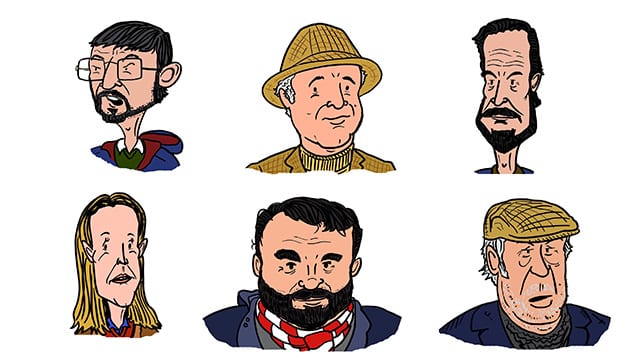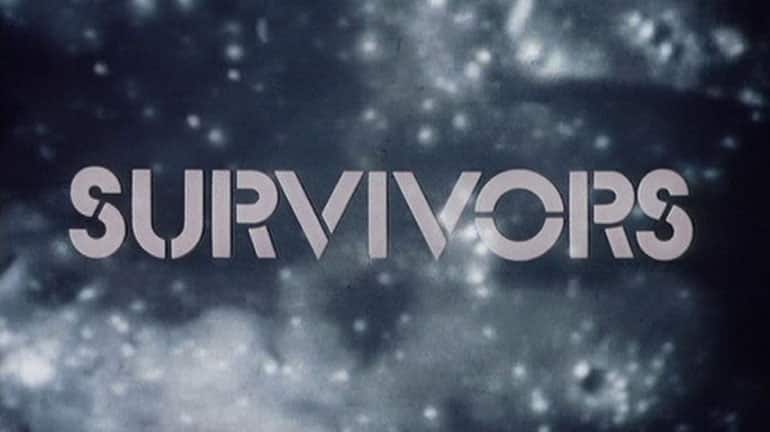It’s the end of the world, or is it a new beginning?
For , it’s the last leg of a gruelling marathon through old videotapes as they rediscover classic BBC TV series Survivors — a prophetic drama from Terry Nation, describing humanity’s bleak future after a devastating pandemic.
Now into the remaining episodes of the third and final season, Greg and Sam have learnt how to mould candles from mutton fat whilst boiling sea water into salt. But such homespun skills suddenly seem redundant, as the narrative shifts from optimistic agriculture to a grim and grimy quest for federation. Or something…
Sam: Greg! Have you seen Greg Preston? I’ve been searching for him on horseback for days. I haven’t had a haircut since March, 1976. Or at least that’s how it feels, as we stretch into the last six episodes of this wobbly final season of Survivors.
Greg: Greg Preston? You just missed him. He was here ten minutes ago.
Sam: Typical. Well, we’re into an episode called The Peacemaker, by Roger Parkes, and it’s all about religion. Or is it? Somebody page Professor Richard Dawkins on MySpace. He’ll have something to say.
Greg: He’s not so keen on the old God-bothering, is he, old Dawko? One of those “new atheists” we hear so much about these days. I prefer the old ones. Less slick.
Sam: Less shrill.
Greg: Anyway, I hear these next six episodes of Survivors we’d better enjoy — the BBC has announced it’s not coming back next year.
Sam: Ah, cutbacks at the Beeb. Well, they do have to justify that worthy licence fee to produce quality bowel movements like Eldorado, Pets Win Prizes and Doctor Who.
Greg: Don’t worry. Word is, Terry Nation is already working on a new show — a space opera about a bunch of freedom fighters taking on an evil federation. A bit like Star Wars — but in space.
Sam: Go on, what did you make of this episode, or do you have no memory of it? I watched it after a boozy night on some prune wine I’d fermented in the lockup.
I remember the first time I saw it; it was boring, peril-less, and my girlfriend took herself off to bed. This time around, it’s pretty much the same story.
Greg: Oh dear. Bleak. Mind you, I can’t imagine anybody’s ever got lucky after a viewing of The Peacemaker. It’s the first of a trilogy by Roger Parkes. Finally, this season reaches some consistency; they are all dull, worthy, and peril-free.
Sam: There’s just not much going on, is there?
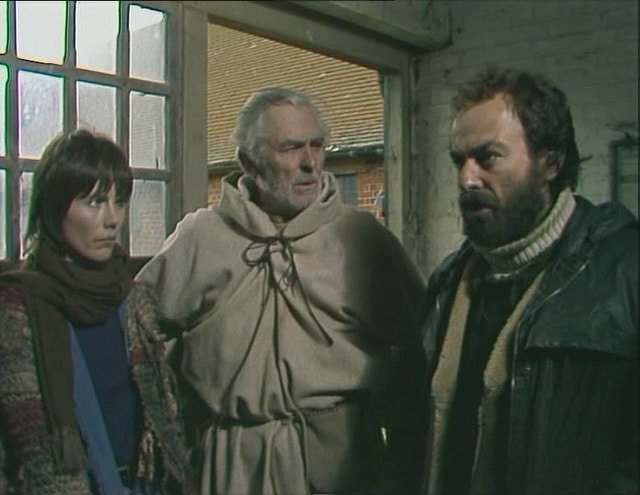
Greg: This is a dreadful episode. I just don’t believe the monk-like community, which is the main sticking point. There’s an uncomfortably patronising depiction of Hinduism, too. What on earth is going on? Who cares?
Sam: Nobody. I felt close to complaining to Anne Robinson on Pointless Views.
Greg: But I’ll tell you who does get lucky — Hubert! He’s well in there with that older lady when he falls injured after the only moment of drama in a turgid fifty minutes of television. Be more like Hubert if you want some action, Sam.
Sam: Oh shush.
Greg: Did you salvage anything? Edward Underdown, for example?
Sam: Edward Underdown as a sort of head monk is charismatic, if wasted in this story. I couldn’t care less about this plodding 50 minutes of dead air, but the concept of Frank as a sage old bird with a dodgy pacemaker is pretty interesting, and we get a remarkable payoff later.
At least we also get a turning point here in the series, don’t we? A move from dull federating to the quest of restoring electrical power. This leads us on to the next episode, Sparks — which unfortunately isn’t about the progressive rock band of the time.
Greg: For me, things went from bad to worse with Sparks. I liked Edward Underdown tagging along for the ride, and it’s nice to see him on location and on horseback. Was the previous episode title a mis-spelling? Should it have been called ‘The Pacemaker’?
Sam: Very good! The script needed one too. Go on.
Greg: They’re off to find Alec Campbell, a lonely and irascible Scotchman who has shunned society for sitting on his arse around a campfire, brooding. Jenny becomes a bit of a cock-tease in this one, doesn’t she? Some notable guest actors again — John Bennett and Linda Polan…
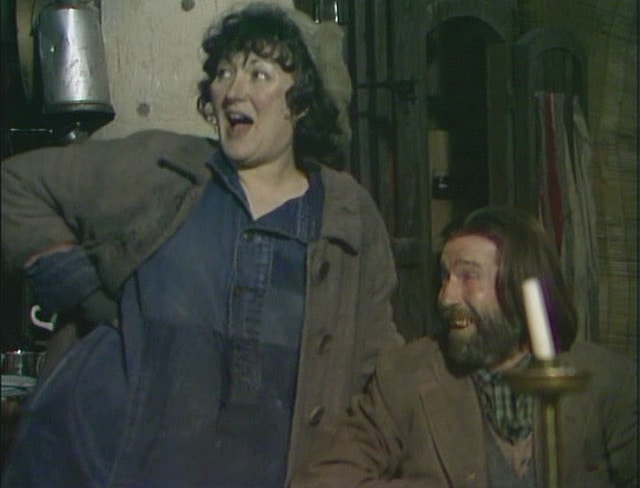
Sam: Those interested finding out more about the late Linda Polan, who played a swinger in a Doctor Who spinoff, need go no further than the podcast Doctor Who and the Complete Menagerie (almost). She’s a wonderful character actress — memorable face. Who said this was a niche article? Anyway…
Greg: K9 & Company’s original ‘sexy lady’.
Sam: Sparks flew in my mind watching this episode. First off, I noticed there was a real push at making this season feel like a western, especially with the horseback action and the macho gun slinging. But in reality, that wouldn’t work in the UK as you’d be crossing roads and fields, both which require special shoeing of hooves, but I might be wrong.
And the second, was how little life there was in the picture; it almost looks like monochrome, perhaps because everyone is wearing earth tones now. It’s remarkably flat-looking for location. Did you feel the photography feels lifeless in this?
Greg: I know what you mean. It’s all shot on tape, which automatically looks flat, too. There’s a nice location in a deserted church, which I believe used to be part of a town that was evacuated, and then the MoD took over ownership, so the church was left to nature. There is some work underway to preserve it.
Sam: Let’s go visit it.
Greg: It’s not a location fans can visit, unless you want to be shot at.
Sam: Let’s not.
Greg: But I’m afraid I just don’t care about Alec Campbell. The actor who plays him, William Dysart, is OK, but a bit one-note. There’s an interminable scene in which he’s distressed that his wife is dead, and Jenny is pretending to be his dead wife as he writhes in a bed, and I found myself saying out loud, “Oh, shut up!” as he moaned on and on.
And then you get an implausible suicide attempt — it’s layered on with a trowel. I hate to sound insensitive, but none of it rang true to me. This was as bad as the worst of Season 2. Am I wrong?
Sam: It’s a filler episode to introduce Alec, for sure, but I was impressed with the fact that Dysart appeared to be teetering on the ledge of church roof for the suicide attempt, which can’t have been easy.
Also, he was in a Doctor Who serial back in 1970, wasn’t he? That villain Reegan in Doctor Who and the Ambassadors of Death.
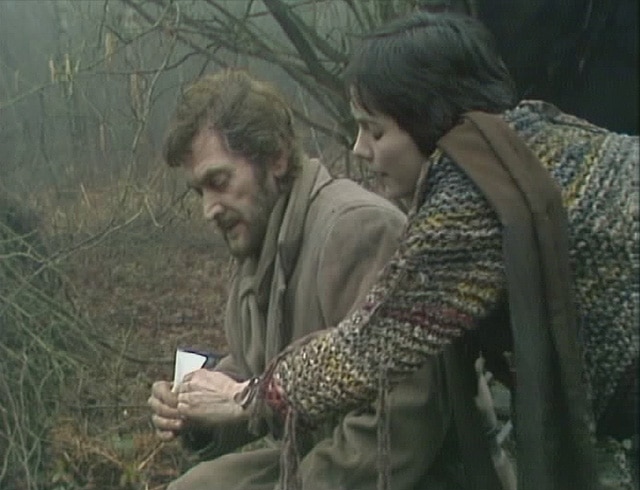
Greg: It is indeed the same chap who starred with Third Dr. Who Jon Pertwee during his first season as the intrepid Time Lord.
Sam: I wasn’t sure at first, because he seems to have lost a lot of weight, perhaps purposefully for this engagement in Survivors, as it’s commented on in the script a few times. He’s a fine actor, just not all that well used.
Greg: He’s a bit gruff and one-note for me. Sparks just left me cold, save for an amusing performance by Gabrielle Hamilton as a batty old dear in racing goggles. But once they have Campbell on board, it’s all systems go for their plot to restore power to the UK. What could possibly go wrong? Do things pick up from here?
Sam: My memory of season three is one of jaded disappointment, but I didn’t think I hated it like I do now. Thank goodness for the next episode. The Enemy takes us to a new settlement in a working mans’ club called the Tollbar.
There’s a mine, a pub with lots of bitter and even bar billiards. Again, the plotting is a bit feeble — where’s Terry Nation? — but the location and character pieces are very rewarding.
Greg: I told you, Terry Nation’s busy scripting a space opera by now. Yeah, the bar billiards scene is a bit weird, isn’t it?
Is it under-rehearsed, or were Lill and Fleming drunk? They’re usually rock solid. When Fleming’s ball hits Lill’s pint glass, she pauses, as if expecting the director to call “cut!”. Which, he doesn’t. Clunky stuff.
Sam: It’s lovely to see Charles and Hubert drinking pints and playing darts, whilst meeting some nicely drawn characters. Sam Mead, for instance…
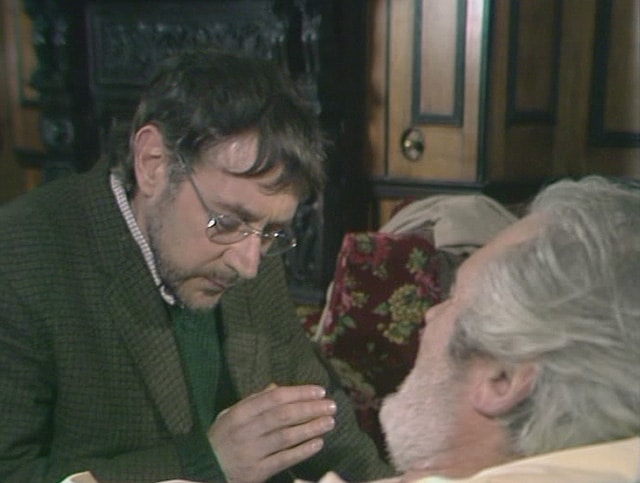
Greg: Yes, returning to the show after his performance playing one of George Baker’s heavies in Season 1’s Gone Away is Robert Gillespie. Best-known for situation comedy roles, especially Keep It In The Family, in which he played manic cartoonist Dudley Rush, he was also in countless dramas of the era. Always a welcome face to spot.
Here, he’s a reformed heroin addict, Sam Mead. His wife is played by fine character actress Frances Tomelty. Trivia: their son as depicted in ‘Survivors’ is Frances’ real-life son, with then-husband Sting, him of pop music success. I may be biased (since I have had the privilege of connecting with Robert through the theatre) but things pick for me in this episode.
Sam: Now I feel I’ve seen Frances Tomelty in lots of things – astonishing to think that’s Sting’s kid before he made it big with that insipid reggae band The Police.
Greg: Frances is a wonderful Northern Ireland actress. Magical with Richard Harris in The Field. Watch it if you’ve never seen it. John “Alien” Hurt is in it, too, as a gibbering madman, and Sean Bean off of Sharpe.
Sam: But what you say about things picking up is true – things are suddenly much more interesting, both in camera and in plot. I think the billiards scene was an attempt to be Kubrickesque… but there’s no way of rehearsing that sort of thing, so they just had to go with it.
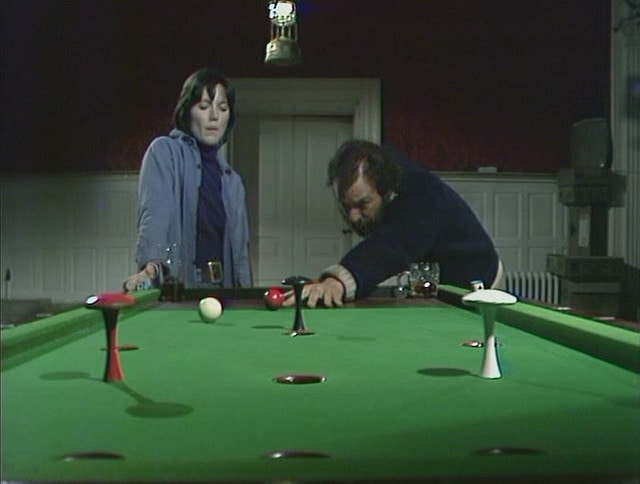
Greg: Did you like Bryan Pringle?
Sam: Bryan Pringle is great in everything, and I enjoyed his performance here – at least it had some spunk as a brash Yorkshireman with stiff views, but in terms of their motivations, which I have great issue with in this season, what were they all at the Tollbar for? The beer? The bar billiards?
Greg: Why indeed? It’s yet another Roger Parkes scenario where Jenny and Charles arrive at a new community and try to get along with them, and there’s very little peril. The height of peril arrives when Jenny calls Charles a “Welsh bastard”.
Here there’s the set-up that Sam Mead is implacably opposed to restoring power, or returning to civilisation as-was, seeing the death as his liberation from heroin addiction. Nevertheless, they take him along for the ride…
Sam: There was one great scene in this episode, though, where Frank is on his deathbed. It’s actually a brilliantly staged death scene – drawn out and gruelling – as Frank’s atomic battery finally gives out on his pacemaker. The irony being, he knows that Sam is intent on stopping power being restored to the country. He attempts to tell Charles that he’s a terrorist, but the pacemaker fails, and so does he.
It’s a powerful moment, and thematically quite smart as it foreshadows all the nuclear stuff.
Greg: Yes, I’ve been very impressed with Edward Underdown, who shortly afterwards would be in the Dr. Who story Meglos, in a similar role. Frank is a memorable and sympathetic character. His death, as Sam Mead rants at him, is very much a warning of what is to come.
The next episode, The Last Laugh, is a bit of change of pace, isn’t it? And a return to what you were saying about a Western theme?
Sam: Have you seen Greg Preston? My memory of The Last Laugh is cheering at the return of a scowling Greg Preston, but then realising how haggard he looked. Do you think Ian McCulloch went on the Special K diet for this? He looks drawn, and covered in stubble. Far from the healthy alpha that we saw in the second season.
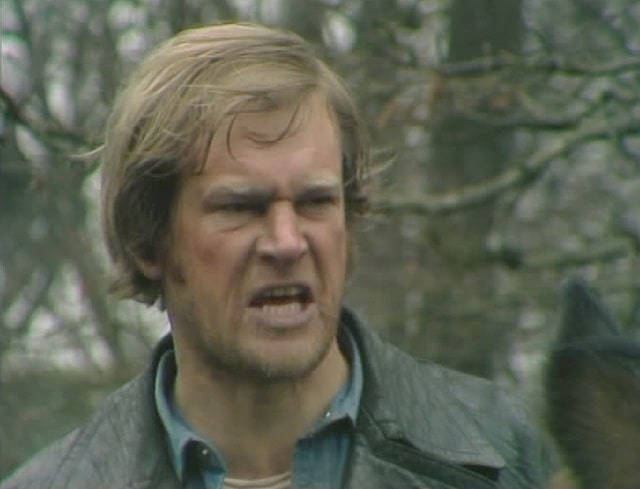
Anyway, like the previous McCulloch cutaway, this episode doesn’t feature many of the core cast — something I’ll drift back to — and basically revolves around Greg getting stabbed, robbed and left for dead. Except he survives, and brings the villains back into his confidence as he has a card up his sleeve…
Greg: It’s a rerun of the original germ warfare, when settlers gave blankets infected with smallpox to Native Americans. The western themes are all there. Greg Preston is literally stabbed in the back by untrustworthy Australians. When recuperating, he thinks he’s unlocked a conspiracy when he finds charred bones hidden on the grounds – but there may be a sensible reason to burn corpses. The theme of sickness spreading through populations returns, as we come full circle.
This episode is high-stakes and very dramatic, though. I love it. There are a few problems I have with it, but for the most part, this is Ian McCulloch’s best script. Do you concur?
Sam: Oh it’s the best out of his trilogy, even though it’s very mean-spirited — either through economic or egotistical motives — for not resolving anything with Jenny, his common-law wife.
But I adored the scene where he’s forced to shoot Jack in the arm to convince the community he’s gone bad — when in fact he just wants to keep them at a distance from his sickness, so he can infect the vigilantes — whilst little Stephen Dudley hands over a heartbreaking reaction of fear. You can hear the grief in McCulloch’s delivery; it’s so very painful.
There are some fine character actors in this too. Dr “Smallpox” Adams is played Clifton Jones, who has lovely diction and appeared in Space: 1999. (Still alive.)
Greg: Clifton Jones is terrific in this, I agree. I think it’s an outstanding episode, perhaps second only to Mad Dog in this season. But John (Stephen Dudley) is reunited with his mother a few episodes earlier, so why is he still hanging around with Jack the carpenter? We never see him again.
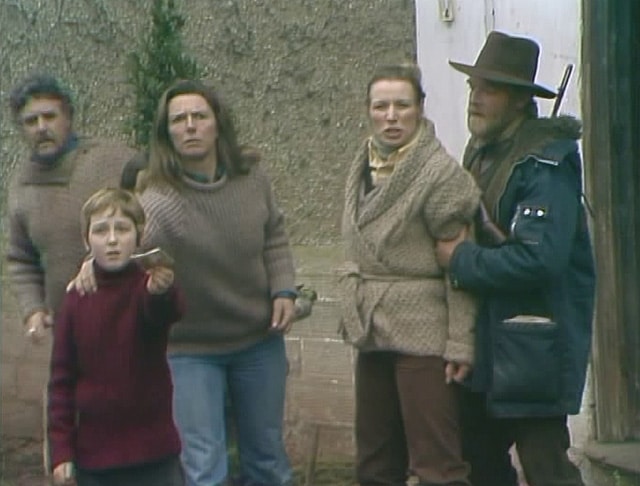
Or had McCulloch not seen the other scripts? This is the last we see of Jack and Pet too, but they don’t get much of a walkdown, do they? Greg Preston, meanwhile, gallantly trots off into the sunset. Which sort of makes the rest of the season redundant?
Sam: Especially as we go headlong into another episode which sticks in my mind simply because I’ve joked about it for over a decade — a whole 50 minutes dedicated to the return of currency, based upon a massive bluff: the assurances of a man who has secretly died of smallpox.
Greg: Have you seen Greg Preston?
Sam: We’re supposed to believe that through all of his federating, Greg Preston has established a chit system in exchange for a fuel reserve. High drama. What does a Greg Preston credit note buy you? How much loo roll? Have you got any flour?
Greg: Haha! How’s the stocks of hand-sanitizer? Yes, we’ve dined out on Long Live The King. How many curries have we partaken of when the “reckoning” arrives asking bemused waiters, “Will you accept a Greg Preston credit note?”
It’s all good fun. There’s a return of Agnes, the Norwegian hottie Greg left his wife and kid for. Also an appearance by Roy Marsden of Inspector Dalgliesh fame as “The Captain”, the thug in charge of the bandits who killed Greg Preston. He has smallpox, but he runs up against Hubert and fails to get the better of him. John Abineri continues to be a delight, even in dull episodes.
Most of this one is shot at an army barracks. It’s not terrible, but Jenny seems to take Greg’s death on the chin. She’s already warmed up Alec Campbell, after all.
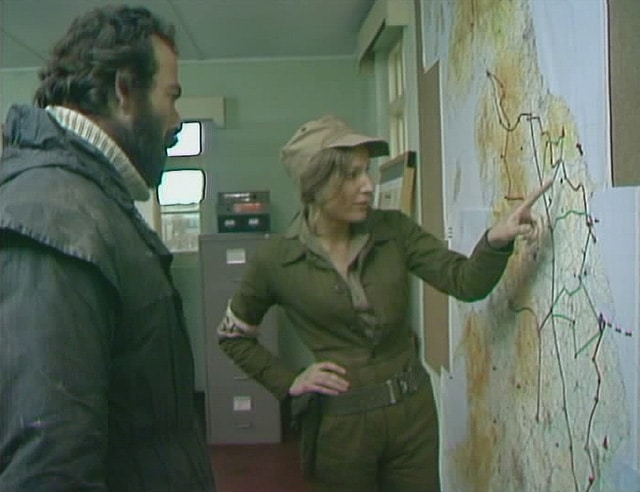
Sam: But what a criminal thing to do to your audience. Not only do we get zero closure with Abby Grant — spoilers; sorry, not sorry — but now we watch Jenny shrug off the fact that Greg has died like a dog somewhere in a barn, off-camera.
Yet there’s a rather dramatic scene between Agnes and Jenny, where our leading lady is cross-examined as a pointless baby boomer who was holding Greg back. That’s rather interesting isn’t it? A hint towards Greg getting his Preston out for Agnes, but also that perhaps Jenny would have been better off with keen breeder Charles Vaughn all along.
What did you make of Agnes’ ludicrous militia outfit? Was it an on-the-nose message about a national socialist drive for capitalism?
Greg: I didn’t find the character of Agnes remotely plausible in this episode, which is stuffed full of cod moralising. My only note on this one ahead of speaking to you about it reads, “We feel cheated”.
The whole season has been built around Charles and Jenny reuniting with Greg. Wild goose chase after wild goose chase. As you say, only for Jenny to find out Greg croaked from a nasty disease and she more or less shrugs her shoulders. “Well, that’s that, then.”
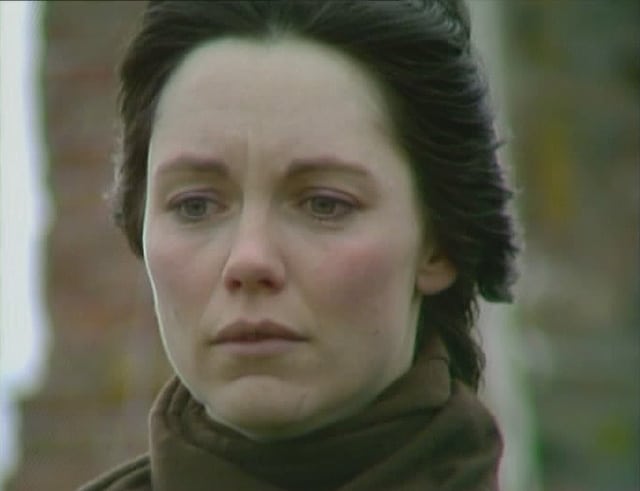
Sam: Have you seen Greg Preston?
Greg: Hmmm, as viewers, we feel desperately short-changed. I was very glad the series was about to round out, as my patience was exhausted by this point. Is the final episode any better?
Sam: From memory, I remember my frustrations, but I tried to approach these fag-end episodes with lower expectations, and for the most part I was rewarded with some interesting character moments and fair storytelling. Does that sound like faint praise?
Greg: Have you had the sickness?
Sam: Anyway, if this final episode, Power, had come, say in mid-way through season two, I feel we’d probably have some very good things to say about it. After all, it has a superb location, lots of running around, and some great guest stars! Ladies and gentlemen, I give you arch character actor, Iain Cuthbertson…
Greg: Ah! Iain Cuthbertson as the Laird! He’s like Nicola Sturgeon, but a 1970s version without the relentless social media virtue-signalling. He’s keen for the Scottish to have sole use of the power, and to deny it to the English, even before the maverick Alec Campbell has used his big spanner to get sparks flowing across our blessed isle. So what’s new?
As a self-contained little adventure, this episode has a lot going for it. There’s a lovely bit in the commentary on the laserdisc where Lucy Fleming says she enjoyed working with Robert Gillespie, who brought “more to the role than was present in the script”, or words to that effect.
Sam: Robert is very good and underplays it nicely. There’s a lot of reacting going on, which of course is the basis for fine acting.
Greg: He has lots of lovely moments and bits of business with William Dysart, who is busy with some horribly turgid dialogue explaining how a hydroelectric power station works. But, thankfully, the dynamic trio of Charles, Jenny and Hubert have plenty to do.
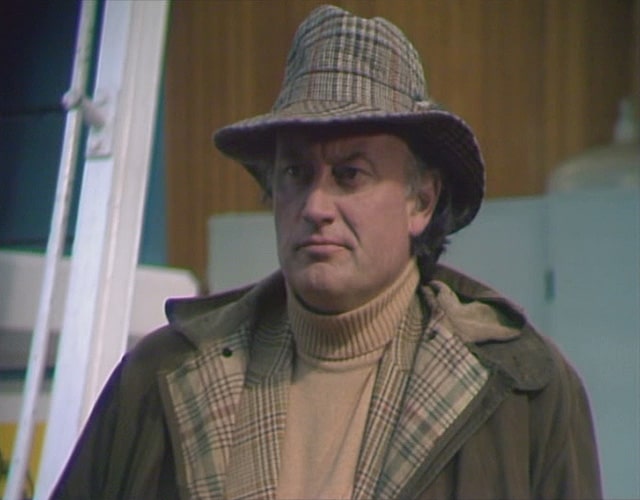
Sam: I very much appreciated how Cuthbertson rocks up in his plaid finery, and in each successive scene accessorizes with more and more tweed until he looks like a window shop dummy in Greenwoods.
Greg: I would wear his wardrobe now… But what do you make of the dramatic resolution?
Sam: There’s a doom-ladened feel to the whole thing, as you know Sam is going to throw a literal spanner in the works — telegraphed rather nicely by him cradling a huge wrench throughout most of the episode. Whilst I don’t agree with Sam’s reasoning for stalling the restart of electrical power, I do think he’s right to stop it.
Greg: Don’t tell me you’ve gone Green?
Sam: What’s the point in restarting the equipment when humankind barely has the resources to mine for iron, or smelt and mould the components needed to maintain the stations? Resources would be better directed to the land and the food. Any restoration of power would only be a short term comfort, say 10 years. What about the next two centuries?
Greg: What made Season 1 work so well was that it depicted the world as we knew it, but yet so scarily alien (until 2020, anyway, without too much hysteria on the current pandemic, which is not as devastating as Terry Nation’s imagined one). Once we move closer to the world as we know it, the drama becomes less intriguing. I guess that’s the problem.
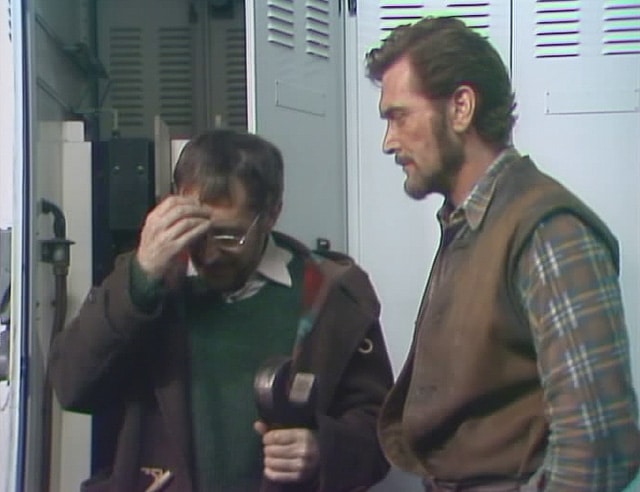
Sam: There’s an overwhelming sense that the writers were running out of ideas.
Greg: They were wise to end the series here, with the restoration of electricity in the UK. Where else was there for the series to go? It was already contradicting itself. Did you hear Cuthbertson’s boast that Scotland is the most heavily-populated region of the UK, simply because they were protected from the disease?
Yet in Season 1’s Gone to the Angels, the survivors kill those they come into contact with who have never been exposed to the sickness, who don’t have herd immunity. When a series is contradicting its own mythology, it’s time to call it a day.
At least, with Power, it goes out on a reasonably strong episode. I was delighted that the dynamic trio of Charles, Jenny and Hubert make it out alive. I still love those characters.
Sam: I wasn’t left wanting another episode, but I’m not sure that’s because I was satisfied – simply wearied by the treasure trail to Greg Preston that led to nothing.
A nice touch? Having the Laird sit down at his table to electrical power, then have his missus turn off the lights so they can enjoy a candlelit supper. That made me chuckle.
My final thought, though, is that it would have been far better to have a final two-parter where they attempt to restart nuclear power, and end up going into a meltdown that fully finishes off all that survived. It would have been like Threads; dramatic, brutal, and a resonating finale.
Greg: Threads? More like Chernobyl: the bitter fruits of socialism laid bare. Now that was a superb mini-series… But back to Survivors. The candlelit supper needed Hyacinth Bucket’s touch of finesse to pull off, I felt. Presumably Patricia Routledge was unavailable.
Sam: I can see you’ve got your spreadsheet out.
Greg: Yes, I could see the light in your eyes waning. As you know, Sam, whilst watching every single episode — all 38 of them, along with you — I kept a tally, ranking each episode a score out of ten. I’d like to ask you how you rank the seasons overall, and I can do my “big reveal” of my top three champions league places.
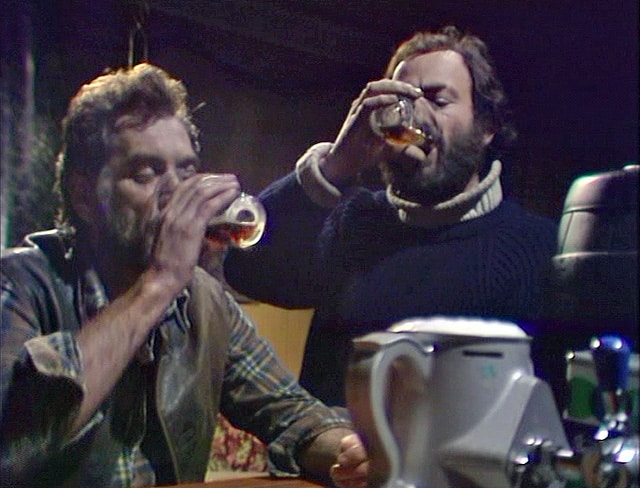
Sam: I think our advice would be universal in terms of the first season, which is must-see television. Seasons 2 and 3 go in very different directions. I’d say season two is the more even-handed, whilst the third at least attempts high drama whilst mostly falling short.
All in all? I stick with Season 1 being the very best, Season 2 being a good follow-up, simply because it has a similar character dynamic, and Season 3 a mixed bag with the odd flash of brilliance, such as Mad Dog and The Last Laugh.
How about you? Do you still feel three is better? What does the data say? Are we still in lockdown?
Greg: Drum roll please: Season one average: 8.3/10, Season two average: 6.2/10, Season three average: 6.4/10.
Sam: Controversial. I think I’ve got the sickness.
Greg: As you can see, Season 1 is an outright winner. Abby Grant rummaging around for her son down the back of the sofa. Talfryn Thomas up to no good with the ladies. Greg Preston at his moody, scowling best.
Admittedly, there’s only one episode of Denis Lill, and Hubert (John Abineri) is yet to come, but in terms of story-telling, Season 1 is very strong. Even the weaker episodes are better than some of the middling episodes of the later seasons.
Sam: Yet Season 3 has the nose on Season 2, for you.
Greg: There’s virtually nothing to pick between two and three, for me, but I think three squeaks into second place simply because it’s slightly more daring than the very safe and worthy Season 2.
Season 3 gets off to a terrific start, where the first four episodes are very impressive, and later picks up again, especially when Robert Gillespie joins the cast, and we get to find out about Greg Preston’s heroic self-sacrifice, but it too has its share of duds.
Sam: Perhaps Greg’s still alive. In his own lockdown somewhere, scowling at a wall. Self-isolating his smallpox.
Greg: As for lockdown, who can tell? Government guidance has been open to interpretation. Should I have taken the dog out for two walks per day? Or is that only allowed if the cock crows three timed and seven hens lay addled eggs?
Sam: Did you see Greg Preston? Two meters, I said two meters…
Greg: I am of course, joking about the dog walking, I haven’t left my house since 2007. I don’t want to be arrested. But I feel I need to watch something more escapist next. Any suggestions?
Sam: Dallas. There’s 17 seasons of that, plus a few movies.
Greg: Is Simon MacCorkindale in it?
Sam: No that’s Manimal. Or JAWS 3D.
Greg: I’ll tell you what I want. I want a curly-haired Welshman in space, with a band of misfits. Maybe something starring Paul Darrow. With a terrific sexy female villain. Written by somebody as good as the guy who created Survivors.
Sam: Can’t think of anything that fits the bill. Tenko? Well, it’s been a delight. To go from the sickness of ‘75, into the summer of ’76 and the frost of early ‘77. I felt I’ve learnt something: always have a parka and shotgun on standby, plant your spuds at right angles to the river, stay away from cities, and breed as much as you can.
Greg: Did you see Greg Preston?
Sam: Now if you’re done, I need to saddle up and go boil sea water for salt. See you when the pubs open again. I’ve got a Greg Preston credit note and it’s my round.
Greg: I’ll only go drinking with you if you tell me straight: have you had the sickness? It’s been a pleasure, old boy. Until the next pandemic, when I’ll dust down my videocassettes once more. Let’s hope when all this is over, my dream comes true, and we queue for Ian McCulloch’s autograph… I told you about that one, didn’t I?
Sam: Indeed, indeed. You can don your waxed jacket and I’ll slip into my double denim western shirt and jeans. See you there. And remember: stay safe, stay alert — avoid the sickness.
